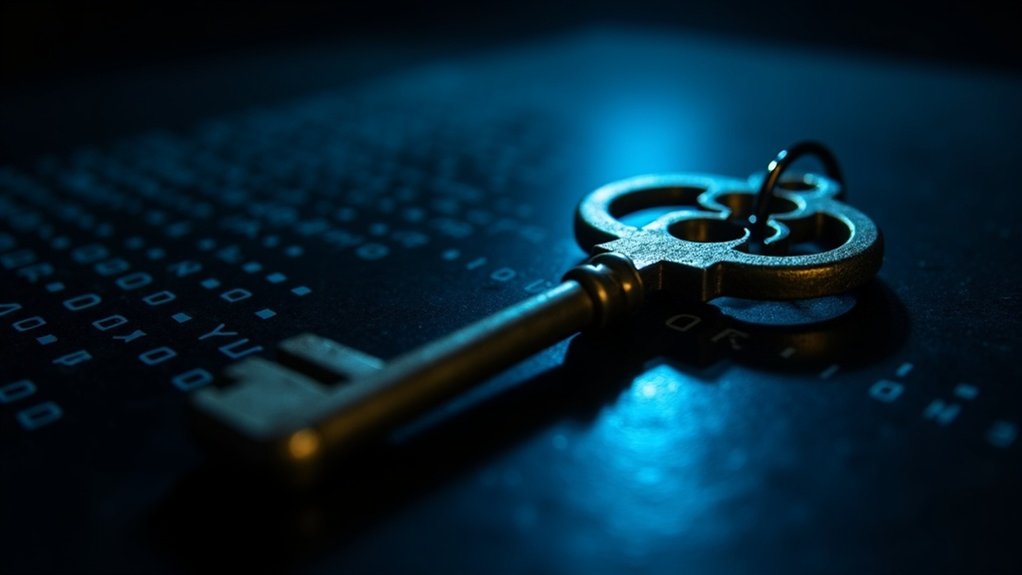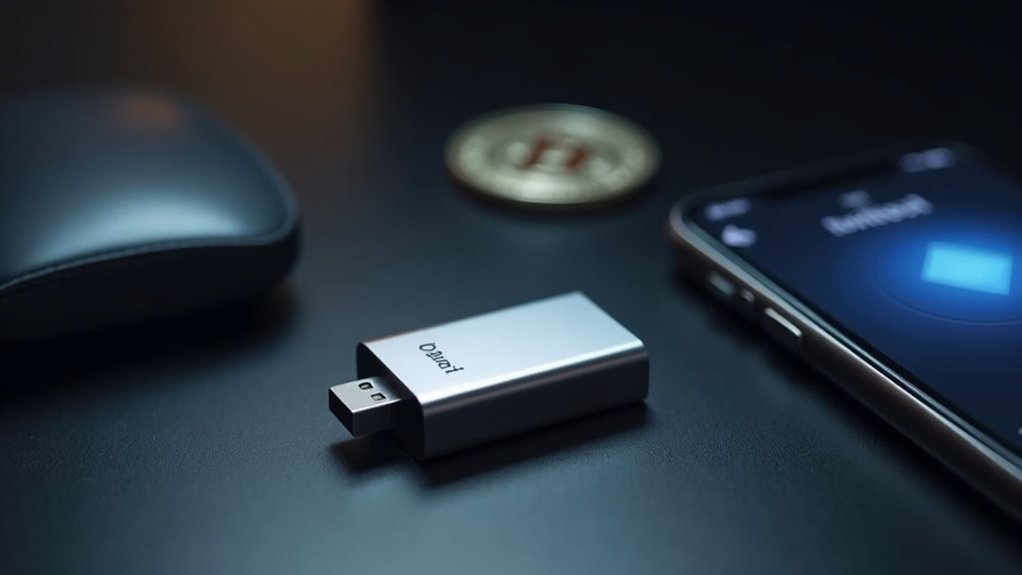Private keys are massive alphanumeric codes that function as the master password to your crypto kingdom. They prove ownership and authorize transactions through unique digital signatures. These keys generate public addresses but can’t be reverse-engineered—a critical one-way street in cryptocurrency security. Lose your private key? Your coins are locked forever. No customer service, no password resets. Cold storage and seed phrases help users manage this responsibility. The entire trustless system hinges on these digital lifelines.
The enigmatic private key sits at the heart of cryptocurrency security. It’s not just some random string of characters—it’s your digital life.
A private key is basically a massive, randomly generated alphanumeric code that functions as the master password to your crypto kingdom.
Usually a 256-bit number in Bitcoin’s case. That’s a lot of bits. And every single one matters.
Private keys prove ownership. Period. Without them, you own nothing in the crypto world.
In crypto, no key means no custody. Your coins exist only where your private keys grant access.
They enable users to sign transactions, providing that all-important cryptographic proof that you—and only you—authorized that transfer of funds.
Lose your private key? Tough luck. Your coins are locked away forever in the blockchain void. No customer service number to call. No password reset option.
These keys work through asymmetric cryptography—a fancy term for a brilliantly simple concept.
Your private key mathematically generates a public key, which creates your wallet address.
People can send crypto to your public address all day long, but only the holder of the matching private key can spend those funds.
The math makes this relationship one-way. You can’t reverse-engineer a private key from a public one. Cryptography is cool like that.
Every transaction on the blockchain requires authorization.
Your private key creates a unique digital signature for each transaction—like a cryptographic fingerprint that the network can verify without ever seeing the actual key.
This signature changes with every transaction. Hackers hate this trick.
Many users opt for cold storage methods to keep their private keys completely offline and safe from potential digital threats.
Modern wallets use seed phrases to help users recover their private keys if needed.
The security model is only as strong as your key management.
Exposure means instant loss. There’s no fraud department to call, no chargebacks, no second chances. The blockchain doesn’t care about your sob story.
The strength of your private key depends largely on its high entropy which makes it virtually impossible to guess through brute force attacks.
The relationship between private and public keys underpins the entire trustless system of cryptocurrency.
Anonymous yet secure. Public yet private.
It’s the perfect contradiction that makes decentralized finance possible. Just don’t lose that key.
Frequently Asked Questions
How Do I Recover a Lost or Forgotten Private Key?
Recovering a lost private key is tough. Nearly impossible, honestly.
If you have your recovery phrase (those 12-24 random words), you’re in luck—just input it into a compatible wallet.
No phrase? Try BTCRecover if you remember parts of it.
Hardware wallet users can use their backup seed phrase.
Some newer wallets offer cloud-based or social recovery options.
But mostly? No recovery phrase equals no funds. Cold, hard truth.
Can Quantum Computing Break Cryptocurrency Private Key Security?
Yes, quantum computing threatens cryptocurrency private keys.
Shor’s algorithm could break elliptic curve cryptography in minutes.
About 25-30% of Bitcoin sits in vulnerable legacy addresses with exposed public keys.
Current quantum computers aren’t powerful enough yet—they need millions of qubits.
But the threat is real.
Experts once thought we had decades. Now? Maybe just years.
Bitcoin’s most vulnerable coins? Those in dormant wallets with exposed keys. Tough luck for them.
What’s the Difference Between Hot and Cold Storage for Keys?
Hot storage keeps cryptocurrency keys online, connected to the internet.
Cold storage keeps them completely offline. Simple as that.
Hot wallets are convenient but vulnerable to hacking—over $7 billion stolen since 2022. Not great odds.
Cold wallets (hardware devices, paper wallets) offer superior security by isolating keys from online threats. They’re clunkier to use though.
Most crypto veterans use both: cold for savings, hot for spending. Makes sense.
Should I Use a Hardware Wallet for Storing Private Keys?
Hardware wallets are the gold standard for private key storage.
They keep keys offline, isolated from internet threats. No hackers, no malware problems. Period.
These devices let users maintain full control without third-party risks while supporting multiple cryptocurrencies.
The secure element chips resist physical tampering too. Even if someone steals the wallet, they can’t access the keys.
User-friendly interfaces make them accessible despite their serious security credentials.
How Often Should I Update or Rotate My Private Keys?
Private keys should be rotated every 6-12 months for standard wallets.
More frequent rotation—every 3-6 months—makes sense for high-value assets.
It’s non-negotiable after suspected compromise. No exceptions.
Security events demand immediate rotation, no matter the schedule. System breaches? Rotate. Software wallet updates? Rotate. Changed custody services? Definitely rotate.
The crypto world isn’t forgiving. Once a key’s compromised, funds vanish. Forever. Balance security with practicality.









